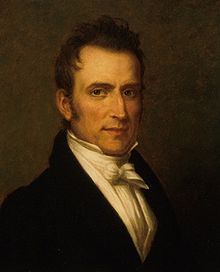John McLean (politician, 1785)
John McLean (born March 11, 1785 in Morris County , New Jersey , † April 4, 1861 in Cincinnati , Ohio ) was an American lawyer and politician . He was a member of the US House of Representatives and held the post of postmaster general under two US presidents , James Monroe and John Quincy Adams . He was also a judge on the United States Supreme Court .
Life
In McLean's early years the family frequently moved around and lived in several border cities, including Morgantown ( Virginia ), Nicholasville ( Kentucky ) and Maysville (Kentucky) before 1797 finally in Ridgeville ( Warren County, Ohio settled).
McLean studied law and was admitted to the bar in 1807. That same year he founded The Western Star , a weekly newspaper in Lebanon , the administrative seat of Warren County, where he practiced as a lawyer. In the following years he decided to embark on a political career. He was elected to the 13th and 14th United States Congresses for the Democratic Republican Party . There he practiced his activity from March 4, 1813 until his resignation in 1816 to accept a seat on the Supreme Court of Ohio . He was elected to the judge's office on February 17, 1816, to succeed William W. Irvin .
politics
McLean resigned as judge in 1822 to comply with President James Monroe's appointment as commissioner of the General Land Office . However, he only kept this office until 1823, when Monroe appointed him to his cabinet as Minister of Post . As such he worked from December 9, 1823 to March 7, 1829, both under Monroe and his successor Adams. During this time, the responsibility of the office expanded greatly - the new western states and territories were added, as well as the transformation of the leadership position into a cabinet post. He also supported Andrew Jackson in his presidential candidacy, who offered him the post of Secretary of War and Secretary of the Navy . However, McLean declined both offices and instead went as a judge to the Supreme Court, where he succeeded the late Robert Trimble .
Known as "The Politician on the Supreme Court," he worked with all parties, first in the Democratic Party with Andrew Jackson's supporters, then with his opponents, with the Anti-Masonic Party , the Whigs , the Free Soilers and finally the Republicans . President John Tyler again offered him the post of Secretary of War, but again declined. Because of his bitter stance against slavery , the new Republican Party viewed him as a possible candidate for president in 1856. Despite his best efforts, the nomination went to John C. Frémont . McLean tried again in 1860 and won twelve votes in the first ballot at the Republican National Convention in Chicago , but the nomination ultimately went to Abraham Lincoln .
In the case of Dred Scott v. Sandford 's massively dissenting views may have led Chief Justice Roger B. Taney to an involuntarily harsh judgment. As a judge, McLean also spoke a judgment that rejected civil copyright law in America ( Wheaton v. Peters ).
John McLean died on April 4, 1861 in Cincinnati and was buried there in Spring Grove Cemetery . He was the last surviving member of the Monroe and Adams cabinets.
family
John McLean had two brothers, William and Finis , who were also involved in politics. His brother William represented Ohio and his brother Finis Kentucky in the US Congress. John McLean's son, Nathaniel, was a Union general during the Civil War .
literature
- Thomas E. Carney: The Political Judge: Justice John McLean Pursuit of the Presidency . Ohio History. v. 111. 2002.
- Francis Phelphs Weisenberger: The Life of John McLean, A Politician On the United States Supreme Court . Columbus, Ohio : The Ohio States University Press, 1937.
Web links
- John McLean (politicians, 1785) in the Biographical Directory of the United States Congress (English)
- John McLean in nndb (English)
- John McLean in the Miller Center of Public Affairs of the University of Virginia (English)
- John McLean in the database of Find a Grave (English)
| personal data | |
|---|---|
| SURNAME | McLean, John |
| BRIEF DESCRIPTION | American lawyer and politician |
| DATE OF BIRTH | March 11, 1785 |
| PLACE OF BIRTH | Morris County , New Jersey |
| DATE OF DEATH | April 4, 1861 |
| Place of death | Cincinnati , Ohio |



